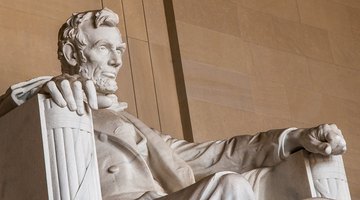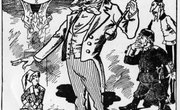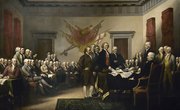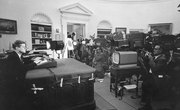An exhaustive list of American political factors during the 1860s would fill volumes. The Civil War (1861-1865) was an intensely complex political period in American history, politics that were not limited to war. Conflict within and between political parties raged on, the business of running the rest of the country needed attending and relations with foreign powers were sometimes delicate. At the political center stage was an American president that history would remember as perhaps the nation's greatest.
The Politics of War
The dominating political issue at the outset of the American Civil War was the effort of the United States to hold the nation together. After the South's secession, the work shifted toward uniting the country to restore the Union. Some of the political actions taken by the administration of Abraham Lincoln bordered on dictatorial, such as the suspension of habeas corpus and the arrest of members of the Maryland legislature.
Political Parties, Abraham Lincoln and Slavery
The Republican Party had existed less than a decade before war began in 1861, and was a coalition of two factions. The radicals were abolitionists who saw the war as a means to end slavery in America. The more moderate wing of the Republican Party was more interested in preserving the Union while keeping slavery contained in states where it was already legal.
The much older Democratic Party split between those who wanted nothing more than peace, even if it meant allowing Southern secession. Other Democrats allied strongly with the Republicans' efforts to maintain the Union while still others opposed secession but did not agree with how Lincoln wanted to prosecute the war. With varying levels of success, Abraham Lincoln was able to form a coalition from both Republican and Democratic factions that successfully defeated the South. Lincoln issued the Emancipation Proclamation and later successfully pressured Congress to adopt the 13th Amendment, which abolished involuntary servitude entirely.
Domestic Politics
Other political business continued as normal. Spurred on by the completion of the transcontinental telegraph in 1861, the nation's rapid western growth slowed only briefly. Territorial and state governments were formed and government offices needed to be filled. The Homestead Act of 1862 opened vacant land to settlement and the Morrill Act transferred over 17 million acres of federal land to the states to raise funds for the creation of agricultural and mechanical universities.
International Relations
The United States was by no means the world player it was to become, yet it still maintained diplomatic and trade relations with numerous foreign powers during the Civil War. The Northern blockade of Confederate ports created trade frictions and political intrigues, and negotiations kept nations like Britain and France neutral. At one point, America and Britain nearly went to war over the seizure of an English vessel carrying Confederate commissioners, but after defusing the situation, Lincoln told his Secretary of State William H. Seward, "One war at a time."
Related Articles
References
Writer Bio
Charles Hooper began writing as a career in 2009. Since then he has published a nonpartisan political advocacy book and hundreds of articles. An honors graduate from the University of North Carolina at Asheville where he concentrated in sociology and political science, he later earned a Masters degree in social work from the University of North Carolina at Chapel Hill.











